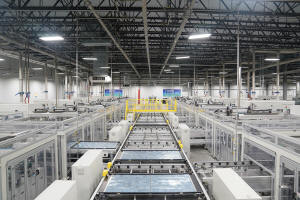|
The
agreement locks in substantial and stable demand for panels
Qcells will make at its new $2.5 billion Georgia factory. For
Microsoft, which was seeking a reliable panel provider to reduce
supply chain risks, the deal will help reach its goal of
powering its operations with 100% renewable energy by 2025.
"How do we really make sure that we can meet those goals in this
kind of an environment, as we see others coming in and doing the
same thing?" Bobby Hollis, Microsoft's vice president for
energy, said in an interview. "We have to really undertake
things in a very strategic and thoughtful way."
The two companies first agreed to a 2.5-gigawatt contract a year
ago. Through this expanded agreement, Microsoft will increase
its total commitment to 12 GW, enough to power about 1.8 million
homes, the companies said.
Qcells said the collaboration with Microsoft will help it
establish a solar supply chain in the United States to compete
with China. The company will produce silicon ingots, wafers and
cells, as well as the modules themselves.
Currently, most panels assembled in the United States use
components made in Asia, where prices have dropped sharply in
the last year. Incentives in President Joe Biden's Inflation
Reduction Act seek to bolster U.S. production of clean energy
components to reduce that reliance on overseas-produced goods.
"We are the only ones that are really building up the full
supply chain. And this is thanks to the partnership that we're
having with Microsoft," Jihyun Kim, an executive vice president
at Qcells, a division of Hanwha Solutions Corp.
(Reporting by Nichola Groom; Editing by Bill Berkrot)
[© 2023 Thomson Reuters. All rights
reserved.]
This material may not be published,
broadcast, rewritten or redistributed.
Thompson Reuters is solely responsible for this content.

|
|




